From the Editor: A Great Man Has Passed
Passage
Baker Lake MLA Speaks Out in Support of Nunavut's Inuit Dogs
Proposed New Dog By-law, a Threat to Iqaluit Dog Team Owners?
Published Research Has Implications for the Aboriginal Inuit Sled Dog!
Fan Mail
The Chinook Project’s July 2013 Visit to Labrador
NFB Increases Internet Accessibility to its Film Library
Movie Review: Vanishing Point
Problems Accessing/Viewing Pages
IMHO: The Back Story of the Thank You DVD
Annual Index
Navigating This Site
Index of articles by subject
Index of back issues by volume number
Search The Fan Hitch
Articles to download and print
Ordering Ken MacRury's Thesis
Our comprehensive list of resources
Defining the Inuit Dog
Talk to The Fan Hitch
The Fan Hitch home page
Editor: Sue Hamilton
Webmaster: Mark Hamilton
The Fan Hitch, Journal
of the Inuit Sled Dog, is published four
times a year. It is available at no cost
online at: https://thefanhitch.org.
The Fan Hitch welcomes your letters, stories, comments and suggestions. The editorial staff reserves the right to edit submissions used for publication.
Contents of The Fan Hitch are protected by international copyright laws. No photo, drawing or text may be reproduced in any form without written consent. Webmasters please note: written consent is necessary before linking this site to yours! Please forward requests to Sue Hamilton, 55 Town Line Rd., Harwinton, Connecticut 06791, USA or mail@thefanhitch.org.
This site is dedicated to the Inuit Dog as well as related Inuit culture and traditions. It is also home to The Fan Hitch, Journal of the Inuit Sled Dog.
The Fan Hitch welcomes your letters, stories, comments and suggestions. The editorial staff reserves the right to edit submissions used for publication.
Contents of The Fan Hitch are protected by international copyright laws. No photo, drawing or text may be reproduced in any form without written consent. Webmasters please note: written consent is necessary before linking this site to yours! Please forward requests to Sue Hamilton, 55 Town Line Rd., Harwinton, Connecticut 06791, USA or mail@thefanhitch.org.
This site is dedicated to the Inuit Dog as well as related Inuit culture and traditions. It is also home to The Fan Hitch, Journal of the Inuit Sled Dog.
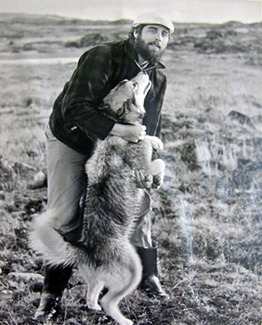
Rankin Inlet (Kangirliniq) 1976
Photo: Duane Starcher
Passage
by Sue and Mark Hamilton
Our hearts are broken. A great, great man has left this Earth. We considered him a friend. And we feel dreadful, too, having lost touch with him for several years. We only learned of his passing while reading an article about an Inuk Elder who had died. It was written by our friend’s daughter, in which she lamented the loss of her own father. Further reading came to an abrupt halt as her words delivered the stunning blow.
We met electronically back in 1997 when he emailed us at the request of a mutual friend who had suggested that contact be made:
Subject: Dogs
Date: Mon, 15 Sep 1997
[I have been asked] to make contact with you and assist you where I can... I ran Eskimo dogs until about ten years ago when I had to quit due to pressure of other activities...Ask the questions and I'll try and answer – perhaps we could get together as I do pass through your part of the country occasionally. I have some pictures and a scrapbook.
He was one of a handful of people we have known, and enormously respected, who used the term “Eskimo Dog”.
Only a part of his distinguished life was devoted to the dogs of the Canadian North. He was a man of enormous talent and interests and skills, worldly in the broadest sense, a wise cracker and practical joker. A float plane in which he was riding crashed upside down on a lake. While the other passengers stood on the wing awaiting rescue, he hid behind the only above-the-water pontoon as the frantic rescuers approached and attempted to account for all the passengers! His ability to get ‘inside the heads’ of his practical joke targets was so complete that during his funeral, a speaker giddily suggested that it wouldn’t be a surprise if the ‘guest of honor’ popped out of his casket to join him at the podium!
A family friend said that trying to sum up his persona/his life was like trying to pour Lake Ontario into a teacup. How very aptly put!
His Inuit friends gave him names in their language. In the Central Arctic he was known as "Hanauřaaliriři" (the one who deals with carvings) and generally across the Arctic he was known more commonly as "Umelik" (one with a beard) and the name in syllabics ᐅᒥᓕᒃ he has used since as his official signature. His daughter Janet wrote, "When I speak to the older ones in the Nattilik area, I always introduce myself as "Umiliup pania, Talurřuani Hanauřaaliriřiuhimaliqtuup pania" (it means, I am Umelik's daughter, the former Hanauřaaliriři's daughter in Spence Bay), and they smile very widely and fondly.”
You may know him by his birth name, John Michael McGrath.
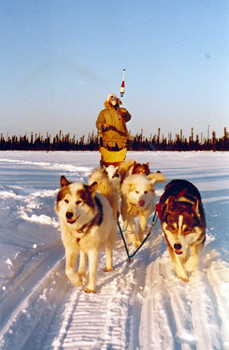
“O the Northern Lights have seen strange sights
as John the Juggler; (with apology to Robert W. Service)
Photo: Eric Hillier
His name often appears on websites as but a brief mention with Bill Carpenter of their shared roles in the Eskimo Dog Recovery Project, begun in the 1970s. While we have always believed that one cannot appreciate the Inuit Dog without an understanding of the People and the Place with which it is associated, so too we believe the same is true of John McGrath (pronounced ‘muhgraw’). This memorial to him in The Fan Hitch hopes to help you understand and appreciate a more complete picture of this extraordinary, passionate and talented man.
Because John’s family and friends spanned six continents, and possibly Antarctica as well, the Pilon Family Funeral Home included on their special page for John a webcast of his memorial service. Be sure to take a look around the site and please do take time to bear witness to his beautiful send off to the hereafter. (Please be patient as it takes some time for the actual services to begin.)
We are also most fortunate to have stories about John’s life contributed by his family and by his friend and colleague Bill Carpenter.
* * *
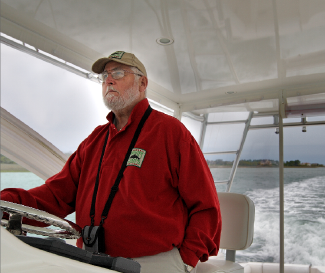
After his family, the sea was John’s first love and a large part of his life
Photo: Frank Kearney
An Unconventional Man and His Remarkable Journey
by his loving wife Judy McGrath,
with children and grandchildren

After his family, the sea was John’s first love and a large part of his life
Photo: Frank Kearney
An Unconventional Man and His Remarkable Journey
by his loving wife Judy McGrath,
with children and grandchildren
For John Michael McGrath life was an extraordinarily remarkable journey, from the shores of Newfoundland and Labrador to the west coast of British Columbia to the Northwest Territories and Nunavut and finally to the Ottawa Valley. Whether he walked, flew, sailed, drove, biked, skidooed, dog sledded, juggled, computed, fished, cooked, golfed, read or just dreamed it, he took his family and friends along for the ride, embracing and entertaining new friends he met along the way.
A demonstration of his many friends became apparent during his year (1989-90) at National Defence College, traveling to 23 countries and every corner of Canada. His classmates challenged him to find a connection at every stop they made. From a soup kitchen volunteer in Toronto, to a translator in Japan, to a fish plant operator in Patagonia, to WWII vets in Prague, John rose to the challenge with relish and didn’t disappoint them.
Born in St. Mary’s, Newfoundland in 1935, his father James was a doctor and had high hopes of John joining the profession. John tried pre-med in university but it didn’t suit him. He liked to say he saved thousands of lives by NOT becoming a doctor.
John joined the Canadian Air Force and pilot training took him to Alberta. The destruction of the innovative Avero Arrow aircraft was such a huge disappointment that he left the Air Force. He learned all he could about the fishing trade while on Canada’s west coast and returned to Newfoundland with his young family to build a large British Columbia style vessel and continued fishing on the east coast, cod instead of salmon and scallops instead of shrimp. An offer to work with fisheries in the High Arctic was one he couldn’t resist, and John became one of the few fishermen to have commercially fished all three of Canada’s coasts.
John became Economic Development Officer for the NWT/Nunavut and Assistant Deputy Minister of Northern Development for Newfoundland and Labrador. During those years he and Bill Carpenter established and worked together on a unique project to help restore the dwindling population of Eskimo Dogs in the Northwest Territories (which then included what is today the Nunavut Territory). And he also became Honorary Colonel to the 440 Squadron of Search and Rescue, Yellowknife.
John was gregarious and had a love of languages. To this day his children remember the magic of trips to the St. John’s harbor with their dad as where he called out in different languages to people on the foreign fishing boats – Portuguese, Russian, French, Spanish – and the laughter and friendliness that accompanied the strange words spoken.
John took his children and grandchildren on road trips to get to know each of them better, and brought far-flung relatives back into the family circle. Family, including ‘found’ family, meant everything to him. A granddaughter wrote, “When you would least expect it, one-on-one he would remind us time and again how wonderful each and everyone of us were.” A daughter remembers, “Dad did little things for everyone with the clear intent of connecting. It might have been a grandchild entering the room and being surprised by a spontaneous juggling act, or a limerick, or a trick, or a gift saved for such a moment for the right person.” His “just because” gifts were legendary among his family and friends.
Wherever John was – west coast of Vancouver Island, Nunavut or Newfoundland & Labrador, Ottawa became the crossroad and anchor for him and upon retirement from the Arctic he moved the family to Pakenham in the Ottawa Valley. John’s uncle, Derek Kearney, was a doctor and had moved to nearby Arnprior, Ontario many years earlier. John soon learned the way of explaining himself was to mention his uncle Derek who, it turned out, had delivered nearly everyone!
John volunteered on the local library board, helped the board of a local housing complex write a new constitution and was the ‘souperintendent’ for the Senior’s lunch program, making homemade soups each week for several years. He didn’t hunt but loved the ambience of the fall hunt camp near Renfrew so he became its cook and entertainer. He also became the cook and night watchman who kept the fires going in Renfrew’s sugar shack each spring. Being rather Santa-like in appearance, he took on that role for the Pakenham school one Christmas and the Inuit community in Ottawa for another. One little three year-old girl threw her arms around John’s neck, planted a huge kiss on him, and declared, “I LOVE you Santa!”
John had an uncanny way of connecting with people right up to the end of his life. On trips to medical appointments while waiting his turn he would strike up a lively conversation with patients or staff, learn surprising things about them, left them smiling and was remembered if they saw him again. A stroke and numerous complications three years previous didn’t diminish his sense of humour.
John died in his sleep at home in Pakenham at the age of 77. He was a plucky Newfoundland Irishman, generous, kind and loyal. He had made the world and the Ottawa Valley his home.
His passing has left a huge hole in our hearts.
* * *
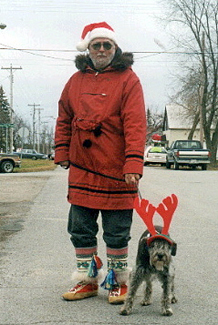
John and his retirement dog, ‘Candydog’
Photo: Paddye Mann
First published in The Globe and Mail (Canada) August 6, 2013
Printed here with permission of the author.
Lives Lived: John Michael McGrath
by Paddye Mann

John and his retirement dog, ‘Candydog’
Photo: Paddye Mann
First published in The Globe and Mail (Canada) August 6, 2013
Printed here with permission of the author.
Lives Lived: John Michael McGrath
by Paddye Mann
Unconventional bureaucrat, fisherman, grandfather. Born April 16, 1935, in St. Mary’s, Nfld., died Feb. 6, 2013, in Pakenham, Ont., of a stroke, aged 77.
Picture a big man – a juggler, sea captain, sealer, boat builder, logger and dog musher. A blue-eyed Irish Newfoundlander with a keen intellect and a wicked sense of humour. This was John Michael McGrath, son of a doctor and a politician, and a great-great-grandnephew of the man who figured out how to lay Marconi’s transatlantic cable.
John was also a bureaucrat, a pilot, village mayor, game officer, philanthropist, bridge player, wordsmith, graduate of the National Defence College (NDC) and honorary colonel of search and rescue. He was a proud Canadian who embodied his Newfoundland roots, a man of real and lasting connections with correspondents from every part of the world.
Wherever he travelled, people knew him – a trait that confounded the other NDC members with whom he travelled the world on a study year. His co-travellers challenged him to find someone he knew in each of the 23 countries they visited. John won.
This one-and-the-same man would finish his workday as assistant deputy minister of northern development, lumber through the front door of his home and, fully clothed, climb into his grandchildren’s bath with them. He had a most unconventional way of being in the world.
A special part of John’s life was taking his children and grandchildren on road trips. He used the journeys to spend time together, to share stories and to meet new people with them along the way. He was great fun to be around, a masterful communicator in any language, for any age.
John had good judgment. In his own words, written about his earlier career: “[After a year at National Defence College], I returned to Goose Bay to find that my position had been filled, so I retired from the Newfoundland government when I found out that I was to be reassigned to the offshore oil field and, considering the advice of that famous philosopher Clint Eastwood, ‘It is a wise man who knows his limitations,’ I decided to go back to my old job in the Northwest Territories as superintendent of economic development and tourism.”
John and his wife Judy retired from the Arctic to Pakenham, Ont., in 1994, having built a life that allowed their five children to thrive in many cultures.
He immersed himself in volunteer work for the library, a subsidized housing complex and the Seniors Eat program. As “souperintendent” for the seniors, he made soups and bread for a community lunch each week.
John was a delightful sight in winter in his Arctic parka, kamiks and crocheted tuque, with his beloved dog ‘Candydog’ by his side.
When a stroke, kidney failure and cancer landed him in hospital, a doctor arrived to deliver a fourth diagnosis of diabetes. John replied: “You tell Mr. Diabetes to stand in line at the door!” It did, but another stroke claimed him three years later.
John was predeceased by his eight-year-old son, and knew the depths of grief and depression. However, for the most part, his journey through life was enthusiastic and rarely without humour. He made the world his home.
Paddye Mann is John’s cousin
* * *

Bill Carpenter (l) & John McGrath (r) together in Yellowknife, May 31, 1983
as the Canadian Eskimo Dog breeding program was winding down.
Photo: Lara Carpenter
A tribute to John Michael "Umelik" McGrath
William J. Carpenter, "Qimmiliriji" (the Dog Man)

Bill Carpenter (l) & John McGrath (r) together in Yellowknife, May 31, 1983
as the Canadian Eskimo Dog breeding program was winding down.
Photo: Lara Carpenter
A tribute to John Michael "Umelik" McGrath
William J. Carpenter, "Qimmiliriji" (the Dog Man)
I was deeply saddened and shocked to learn of the passing in February 2013 of our friend and my mentor, John Michael McGrath, known also as "Umelik" to the Inuit of northern Canada. He was an inspiration to all of us on the issues associated with the Eskimo Dog and had it not been for his leadership, wisdom, knowledge, judgment and direction, none of us would be linked together under our common cause and interest. John had strong good opinions on many subjects and he was not afraid to express his view which is how he made such an impression on me when we first met in 1972. When eventually our discussions led to the need to save and preserve the Eskimo Dog, we commenced on a project that became the focus of our lives from that point on.
John spoke with passion and commitment that was unsurpassed. His presentation to the Yankee Alaskan Malamute Club of New England annual general meeting in Massachusetts in January 1998 was a shining example of his passion and while the written paper was a complete documentation of what we did together over the years, it was his presentation of that paper that brought out his wonderful sense of humour which his wife Judy told me he never lost right up to the end. The DVD of his talk is available from The Fan Hitch and the DVD is well worth seeing. I will never forget the time when, as a humourist, John handed me a business card that said “John McGrath: Grand Poobah of the Central Arctic”.
During his long and amazing career John had been a sea captain, sealer, boat builder, logger, surveyor, poker player, pilot, bureaucrat, golfer, cook, game officer, village mayor and a great dog musher. In relation to our Canadian Eskimo Dog work, he had been the President of the Eskimo Dog Society of the NWT, was a member of Canadian Kennel Club’s “Breed Standard Committee of the Eskimo Dog” and was a Director on the non-profit “William Carpenter Eskimo Dog Research Foundation”.
John will be recorded in history as a truly remarkable man and those associated with Eskimo Dogs now and in the future will forever remember his name and how he started us down our mutual paths.
Please join with me in sending our sincere heart felt sympathies to John’s wife Judy and children Janet, Lani, Sean and Karla and their families.
* * *
Please join us to honor John “Umelik” McGrath’s remarkable life!
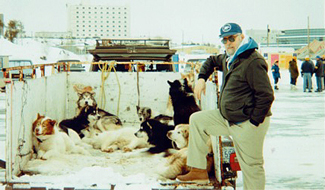
John standing beside Bill Carpenter's trailer with Bill's Eskimo
Dogs at the Yellowknife Caribou Carnival Photo: Bill Carpenter
Please join us to honor John “Umelik” McGrath’s remarkable life!

John standing beside Bill Carpenter's trailer with Bill's Eskimo
Dogs at the Yellowknife Caribou Carnival Photo: Bill Carpenter
Back in January 1998, John travelled from his home in Ontario to our home in Connecticut and from there we drove to Massachusetts to attended the annual meeting of the Yankee Alaskan Malamute Club of New England – we were members in our former lives – where he entertained and enlightened a large audience about the Canadian Eskimo Dog Recovery Project. We have recently digitized John’s 67-minute presentation (which includes a slide show). With his family’s blessing, you can have your own copy of the DVD in exchange for a donation to the Ilisaqsivik Society:
“Incorporated as a non-profit, community-based Inuit organization in 1997, Ilisaqsivik Society is dedicated to promoting community wellness in Clyde River, Nunavut. Ilisaqsivik provides resources and programming that enables families and individuals to develop their strengths, contribute to community wellness, and focus on health and healing. Ilisaqsivik strives to support community development and wellness in a way that maintains respect for traditional Inuit teachings and learning and is accountable to the community.”
Ilisaqsivik’s “Qimmivut” (Our Dogs) workshop introduces Clyde River youth and young adults to Inuit Qaujimajatuqangit (IQ, Inuit Knowledge) through dog teaming and land-based hunting and camping trips facilitated by experienced mushers, hunters, and elders. Musher instructors are paired with youth apprentices for several expeditions to traditional camps of historical and cultural importance. Traveling by dog team provides an excellent opportunity to transfer IQ, including practical navigation, travel, camping, tool making and harvesting skills. Participants learn specific skills such as caring for and working with dogs, commands, how to make dog harnesses, leads, whips, and backpacks, safe winter travel and camping, and hunting...”
For a beautiful overview of the comprehensive Ilisaqsivik programs be sure to watch the Ilisaqsivik documentary (link on their home page).
HOW TO DONATE
OPTION 1:
Donation plus DVD of “Umelik’s” January 1998 presentation on the Canadian Eskimo Dog:
Send a check or money order in US dollars; or by PayPal using qimmiq@snet.net (MUST be funded from either a bank account or PayPal balance ONLY! To maximize the value of your contribution send donations as a "transfer" not as a "purchase" which will be transferred to Ilisaqsivik) to:
John “Umelik” McGrath MemorialPlease consider a minimum donation of $25.00 plus shipping for the DVD. Shipping to the US and Canada* is $2.00; $3.00 to the rest of the world. (Please note that postage rates are out of our control and are subject to change without notice.)
c/o Sue Hamilton
The Fan Hitch
55 Town Line Road
Harwinton, CT 06791
USA
*Canadian residents take note! Ilisaqsivik Society is a registered Canadian charity. If you would like a receipt for tax purposes be sure to indicate so and one will be provided to you by the Ilisaqsivik Society.
OPTION 2:
Donations without requesting the DVD:
Donations may be sent directly to the Ilisaqsivik Society (please note that the donation button on their website does not work yet!). Send check or money order in Canadian dollars and indicate the donation represents the John “Umelik” McGrath Memorial. Canadian residents may request a receipt for tax purposes.
Ilisaqsivik Society
Jake Gearheard, Executive Director
P.O. Box 150
Clyde River NU X0A 0E0
For more information:
Phone: (867) 924-6565
Fax: (867) 924-6570
jakobmg@ilisaqsivik.ca
* * *
John,
“May the road rise to meet you,
May the wind be always at your back,
May the sun shine warm upon your face,
The rains fall soft upon your fields and, until we meet again,
May God hold you in the hollow of His hand.”
Traditional Gaelic blessing
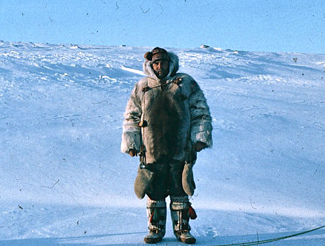
John Michael “Umelik” McGrath Photo: Judy McGrath
This article is available to download and print in .pdf format here.
John,
“May the road rise to meet you,
May the wind be always at your back,
May the sun shine warm upon your face,
The rains fall soft upon your fields and, until we meet again,
May God hold you in the hollow of His hand.”
Traditional Gaelic blessing

John Michael “Umelik” McGrath Photo: Judy McGrath
This article is available to download and print in .pdf format here.